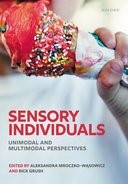 Sensory Individuals: Unimodal and Multimodal Perspectives
Sensory Individuals: Unimodal and Multimodal Perspectives
Contents
-
-
-
-
1 Sensory individuals—current state of the field 1 Sensory individuals—current state of the field
-
2 Summary and overview of the contributions 2 Summary and overview of the contributions
-
Acknowledgements Acknowledgements
-
References References
-
-
-
-
-
-
-
-
-
Introduction: Sensory individuals: Contemporary perspectives on modality-specific and multimodal objecthood
Get access-
Published:July 2023
Cite
Abstract
This collection of new essays on sensory individuals in unimodal and multimodal perception features contributions by outstanding researchers in the fields of philosophy of perception, experimental psychology, and cognitive neuroscience. The topics investigated include conceptual, developmental, and methodological aspects of object perception, and especially how various sense modalities construct their objects from sensory features and feature bearers. The interdisciplinary approach offered has enabled new directions in research on this subject. As ordered in this volume, the topics of the contributions progress from treating neural sensory processes as primarily unisensory towards approaches that take perceptual processing to be modality-independent, meta-modal, and multimodal. Even within these latter approaches, sensory stimuli, sensory properties, brain activations, and corresponding perceptual phenomenology have often been characterized in a modality-specific way. Thus, it is timely to explore the relation between those processes that are unisensory and those that are multisensory. One of the primary themes of this collection is examining whether the basic building blocks of human perception are best understood as modality-dependent units of different forms or in terms of multimodal perceptual objects. Another theme is the relation between low-level object processing (segmentation and perceptual grouping processes) and high-level object knowledge embracing object concept and object-related expectations. A final theme is the role that perceptual objects play as loci of unification in unimodal and multimodal perception, namely that they enable binding and integration of sensory properties to individual entities or events.
Sign in
Personal account
- Sign in with email/username & password
- Get email alerts
- Save searches
- Purchase content
- Activate your purchase/trial code
- Add your ORCID iD
Purchase
Our books are available by subscription or purchase to libraries and institutions.
Purchasing information| Month: | Total Views: |
|---|---|
| August 2023 | 1 |
| September 2023 | 32 |
| October 2023 | 3 |
| November 2023 | 2 |
| December 2023 | 2 |
| January 2024 | 6 |
| February 2024 | 7 |
| March 2024 | 1 |
| April 2024 | 5 |
| May 2024 | 9 |
| June 2024 | 7 |
| July 2024 | 6 |
| August 2024 | 2 |
| September 2024 | 1 |
| November 2024 | 3 |
| December 2024 | 11 |
| February 2025 | 4 |
| March 2025 | 2 |
| May 2025 | 1 |

Get help with access
Institutional access
Access to content on Oxford Academic is often provided through institutional subscriptions and purchases. If you are a member of an institution with an active account, you may be able to access content in one of the following ways:
IP based access
Typically, access is provided across an institutional network to a range of IP addresses. This authentication occurs automatically, and it is not possible to sign out of an IP authenticated account.
Sign in through your institution
Choose this option to get remote access when outside your institution. Shibboleth/Open Athens technology is used to provide single sign-on between your institution’s website and Oxford Academic.
If your institution is not listed or you cannot sign in to your institution’s website, please contact your librarian or administrator.
Sign in with a library card
Enter your library card number to sign in. If you cannot sign in, please contact your librarian.
Society Members
Society member access to a journal is achieved in one of the following ways:
Sign in through society site
Many societies offer single sign-on between the society website and Oxford Academic. If you see ‘Sign in through society site’ in the sign in pane within a journal:
If you do not have a society account or have forgotten your username or password, please contact your society.
Sign in using a personal account
Some societies use Oxford Academic personal accounts to provide access to their members. See below.
Personal account
A personal account can be used to get email alerts, save searches, purchase content, and activate subscriptions.
Some societies use Oxford Academic personal accounts to provide access to their members.
Viewing your signed in accounts
Click the account icon in the top right to:
Signed in but can't access content
Oxford Academic is home to a wide variety of products. The institutional subscription may not cover the content that you are trying to access. If you believe you should have access to that content, please contact your librarian.
Institutional account management
For librarians and administrators, your personal account also provides access to institutional account management. Here you will find options to view and activate subscriptions, manage institutional settings and access options, access usage statistics, and more.